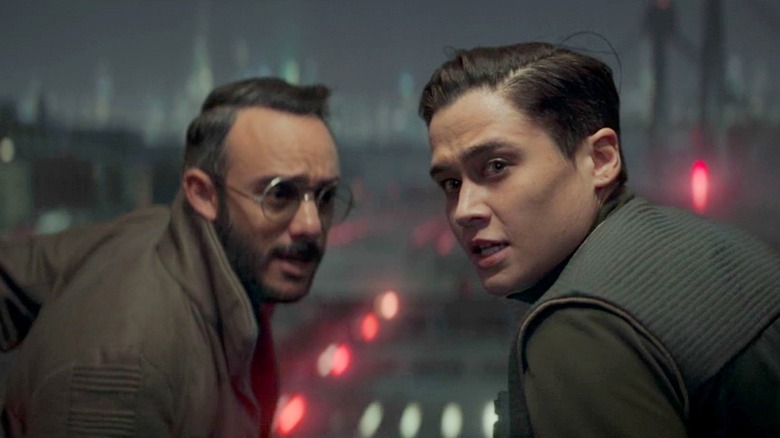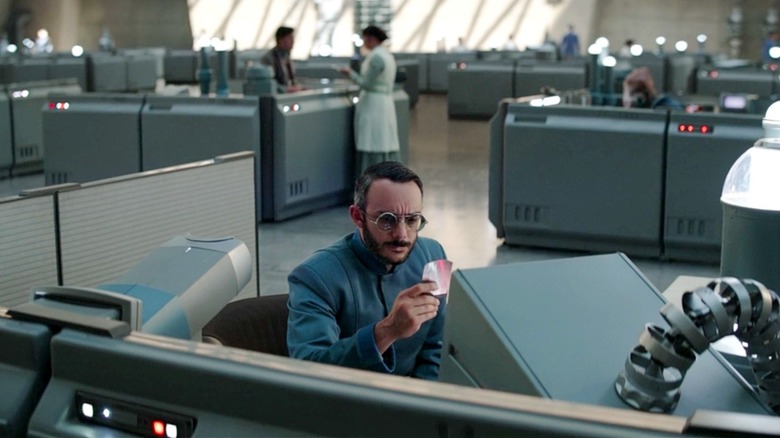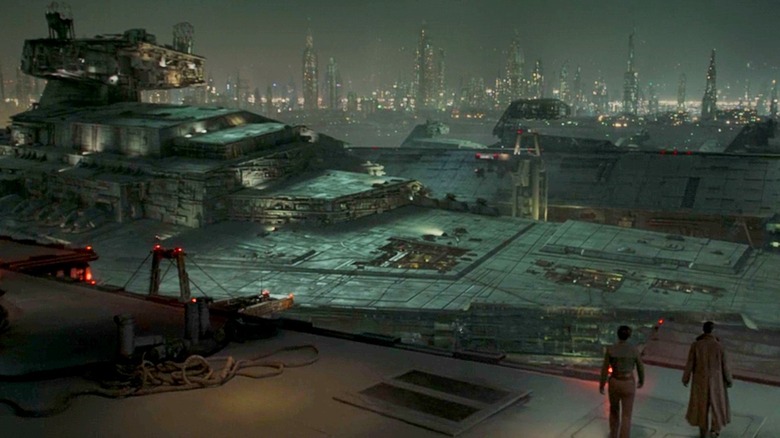The Mandalorian Season 3 Episode 3 Kinda Feels Like An Episode Of Star Trek With Star Wars Bookends
This post contains spoilers for episode 3 of "The Mandalorian" season 3.
This week's episode of "The Mandalorian," titled "The Convert," has multiple meanings.
"The Convert" starts out in familiar territory — right after Bo-Katan (Katee Sackhoff) saves Din Djarin (Pedro Pascal) from drowning in the living waters and encounters a real life Mythosaur, her entire belief system has been challenged. Though, she won't let Din see that yet. As the two try to walk their separate ways, they are attacked by an overwhelmingly large squadron of TIE Interceptors. Who are their Imperial attackers now that Moff Gideon (Giancarlo Esposito) has reportedly been arrested? We don't know yet.
As Bo-Katan's home on Kalevala is destroyed by TIE Bombers, she makes a quick escape with Din Djarin to somewhere the Imperials can't find them. All of a sudden, after the usual "Mandalorian" title sequence, the perspective of the episode takes a bold switch to ex-Gideon collaborator and cloning scientist, Dr. Pershing (Omid Abtahi) and his new daily life on Coruscant. We learn that in the aftermath of the fallen Empire, ex-Imperials are given the choice to integrate themselves into society and use their expertise to benefit the New Republic.
Musings on futuristic science, morality, and the concepts of rehabilitation/redemption? We're not on Tatooine anymore, folks. In this week's "The Mandalorian," we've officially entered "Star Trek" territory.
The New Republic is not so bright
There are some points of "The Convert" that feel much more in conversation with something like "Andor" than "The Mandalorian," which is hardly unintentional. Coruscant puts on more of a shinier facade than any of the settings in "Andor," but the spirit of its office spaces and boardrooms are just as sterile and excessive. Though it was formed through good intentions, it seems that the New Republic's government systems are almost as monotonous, secretive, and depressing to live in, and in some disturbing ways, they uphold troublesome ideals much like the Galactic Empire they were trying to overthrow.
After his presentation on the cloning process, the episode shows Pershing's struggle to adjust to his new daily life. Every day, he speaks to a droid to "confirm" his gradual re-conditioning, sits in his cubicle to de-commission Imperial technology, tries to blend into Coruscant's society, and longs for the taste of Imperial rations.
It is through his budding companionship with Elia Kane (Katy O'Brian), who we'd previously seen working on Moff Gideon's ship, where Pershing opens up about his discontent with the New Republic's strict red tape. Though he clearly has a desire to improve life for other people through science, he feels he's most capable of that by using the Imperial technology and code that is being set up to be destroyed. Elia tells Pershing that she knows the location of an off-site scientific base where Pershing could potentially snag a mobile lab to get research done in secret. So they run together to the outskirts of Coruscant, a seedier side full of wreckage and junk instead of neon skyscrapers and nightclubs. They find themselves a de-commissioned Star Destroyer and look for parts.
It's apparent by her agreeable nature that Elia's intentions are not what she says they are, but once Pershing is betrayed and captured, his punishment is much more cruel than one would imagine.
Science, morality, and disillusionment
As it turns out, the defected Imperials that joined the amnesty program have been "reconditioned," not just through droid therapy and the welcoming of community, but also through the use of a painful, mechanical mind flayer. Here, the seedy underbelly of the New Republic is exposed to the audience for the first time in live action. Sure, maybe this episode isn't as clever, nor as nuanced as the world in "Andor," but watching "Star Wars" finally embracing the complicated morality of its sci-fi world and concepts in a way reminiscent of "Star Trek" usually does is refreshing. Time and time again, fans have been asking "Star Wars" to reinvent itself, and while it's unusual to see it in the middle of a "Mandalorian" episode, a change of pace is always welcome.
At the end of the episode, we switch back to the familiar "Star Wars" we know and love. Din and Bo-Katan's perspective as they prove Din's bathed in the living waters to the Children of the Watch. The Armorer (Emily Swallow) redeems Din, but also tells Bo-Katan that since she has also followed the same rules as Din, she is also accepted as a member of their religion for as long as she keeps her helmet on.
"The Convert" referred to in the title, represents the two character journeys displayed in the episode — Pershing's forced and literal conversion into the New Republic, and Bo-Katan's awakening from her disillusionment, seeing a new Mandalorian culture from Din's eyes.


